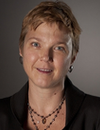Linda Griffith,
Professor,
Massachusetts Institute of Technology (MIT)
Linda G. Griffith, PhD, is the School of Engineering Teaching Innovation Professor of Biological and Mechanical Engineering and MacVicar Fellow at MIT, where she directs the Center for Gynepathology Research and the Human Physiome on a Chip Project supported by the DARPA/NIH-funded Microphysiological Systems Program. Dr. Griffith received a Bachelor's Degree from Georgia Tech and a PhD degree from the University of California at Berkeley, both in chemical engineering. Dr. Griffith’s research is in the field of regenerative medicine and tissue engineering. Her laboratory, in collaboration with J. Upton and C. Vacanti, was the first to combine a degradable scaffold with donor cells to create tissue-engineered cartilage in the shape of a human ear. The 3D Printing Process she co-invented for creation of complex scaffolds has been commercialized for manufacture of FDA-approved scaffolds for bone regeneration. She is also a pioneer in devising ways to control nano-scale stimulation of cells by molecular cues, and in creation of 3D tissue models for drug development. The 3D perfused “LiverChip” liver tissue culture technology has been commercialized for applications in drug development. A current focus is integration of tissue engineering with systems biology, with an emphasis on endometriosis and other women’s reproductive diseases. She is a member of the National Academy of Engineering and the recipient of a MacArthur Foundation Fellowship, the Popular Science Brilliant 10 Award, NSF Presidential Young Investigator Award, the MIT Class of 1960 Teaching Innovation Award, Radcliffe Fellow and several awards from professional societies. She has served as a member of the Advisory Councils for the National Institute for Dental and Craniofacial Research and the National Institute of Arthritis, Musculoskeletal and Skin Diseases at NIH. As chair of the Undergraduate Curriculum Committee for Biological Engineering at MIT, she led development of the new Biological Engineering SB degree program, which was approved in 2005 as MIT’s first new undergraduate major in 39 years.
|

|
Move Over, Mice -- How the Fusion of Systems Biology with Organs on Chips May Humanize Drug DevelopmentThursday, 7 July 2016 at 09:30 “Mice are not little people” – a refrain becoming louder as the strengths and weaknesses of rodent models of human physiology and disease become more apparent. At the same time, three emerging approaches are headed toward integration: powerful systems biology analysis of intra- and inter-cellular signaling networks in patient samples; 3D tissue engineered models of human organ systems, often made from stem cells; and microfluidic devices that enable living systems to be sustained and used for models like cancer metastasis. This talk will highlight the integration of these rapidly moving fields to understand difficult clinical problems, and will especially highlight intellectual and technical challenges in transitioning “organs on chips” platforms from academic publications into practical use.
|

 Add to Calendar ▼SELECTBIOenquiries@selectbiosciences.com
Add to Calendar ▼SELECTBIOenquiries@selectbiosciences.com Add to Calendar ▼SELECTBIOenquiries@selectbiosciences.com
Add to Calendar ▼SELECTBIOenquiries@selectbiosciences.com Add to Calendar ▼2016-07-07 00:00:002016-07-08 00:00:00Europe/LondonOrgan-on-a-Chip World Congress and 3D-Culture 2016Organ-on-a-Chip World Congress and 3D-Culture 2016 in Boston, USABoston, USASELECTBIOenquiries@selectbiosciences.com
Add to Calendar ▼2016-07-07 00:00:002016-07-08 00:00:00Europe/LondonOrgan-on-a-Chip World Congress and 3D-Culture 2016Organ-on-a-Chip World Congress and 3D-Culture 2016 in Boston, USABoston, USASELECTBIOenquiries@selectbiosciences.com